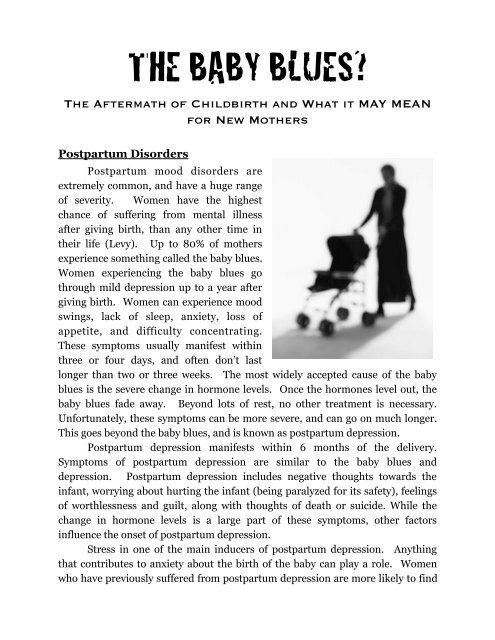The Skriker Actor Packet
The Skriker Actor Packet
The Skriker Actor Packet
Create successful ePaper yourself
Turn your PDF publications into a flip-book with our unique Google optimized e-Paper software.
THE BABY BLUES?<br />
<strong>The</strong> Aftermath of Childbirth and What it MAY MEAN<br />
for New Mothers<br />
Postpartum Disorders<br />
Postpartum mood disorders are<br />
extremely common, and have a huge range<br />
of severity. Women have the highest<br />
chance of suffering from mental illness<br />
after giving birth, than any other time in<br />
their life (Levy). Up to 80% of mothers<br />
experience something called the baby blues.<br />
Women experiencing the baby blues go<br />
through mild depression up to a year after<br />
giving birth. Women can experience mood<br />
swings, lack of sleep, anxiety, loss of<br />
appetite, and difficulty concentrating.<br />
<strong>The</strong>se symptoms usually manifest within<br />
three or four days, and often don’t last<br />
longer than two or three weeks. <strong>The</strong> most widely accepted cause of the baby<br />
blues is the severe change in hormone levels. Once the hormones level out, the<br />
baby blues fade away. Beyond lots of rest, no other treatment is necessary.<br />
Unfortunately, these symptoms can be more severe, and can go on much longer.<br />
This goes beyond the baby blues, and is known as postpartum depression.<br />
Postpartum depression manifests within 6 months of the delivery.<br />
Symptoms of postpartum depression are similar to the baby blues and<br />
depression. Postpartum depression includes negative thoughts towards the<br />
infant, worrying about hurting the infant (being paralyzed for its safety), feelings<br />
of worthlessness and guilt, along with thoughts of death or suicide. While the<br />
change in hormone levels is a large part of these symptoms, other factors<br />
influence the onset of postpartum depression.<br />
Stress in one of the main inducers of postpartum depression. Anything<br />
that contributes to anxiety about the birth of the baby can play a role. Women<br />
who have previously suffered from postpartum depression are more likely to find



